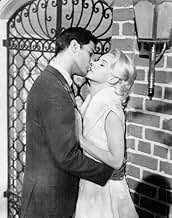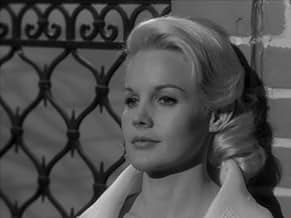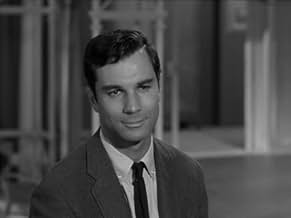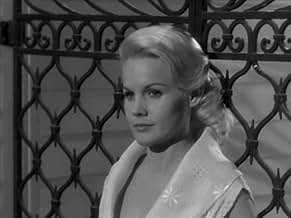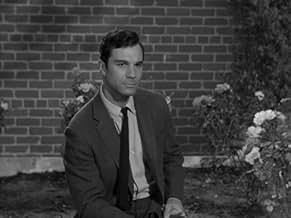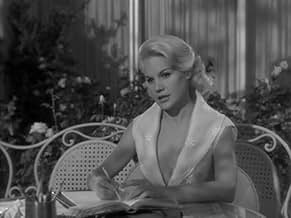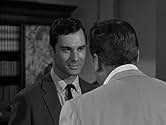Ajouter une intrigue dans votre langueA millionaire with a mysterious fiancee hires a detective to discover the truth about her past.A millionaire with a mysterious fiancee hires a detective to discover the truth about her past.A millionaire with a mysterious fiancee hires a detective to discover the truth about her past.
- Réalisation
- Scénario
- Casting principal
Ricky Allen
- Boy in Library
- (non crédité)
Val Avery
- Pudgey Smith
- (non crédité)
Avis à la une
The best thing about this movie is the truly first-rate supporting cast: Peter Lawford, Viveca Lindfors, Aldo Ray and Ann Sothern all give outstanding performances. Ann's, in particular, will stay with you long after the movie is over. She's a gem!
Sylvia is a well developed film, from cast to direction. It was far ahead of its' time. The plot is slow in the beginning but quickly moves to a steady pace. Sylvia confronts difficult issues few movies can handle with any lasting credibility. The characters are rich and diverse in their perspectives. Carroll Baker delivers a superb performance as the female lead. Carroll Baker's supporting actors and actresses enrich the weave of the emotional undercurrents of the film. Sylvia is also complemented with the use of vivid symbolism and well formed dialogue.
Carrol Baker is fluidly extraordinary in this film. Her character's life is explored in a dreamlike series of flashbacks which unravel like time travel. The various other characters are woven in and out in florishes from charactor actors.
I had seen this a long time ago then caught it on Turner Classics. Kind of bizarre in a good way.
Because of the complexity of the subject matter and the way the film is structured, I think it will get better on repeated viewings.
I had seen this a long time ago then caught it on Turner Classics. Kind of bizarre in a good way.
Because of the complexity of the subject matter and the way the film is structured, I think it will get better on repeated viewings.
Excellent Carroll Baker flick. Made just before Harlow almost ruined her career. Carroll plays a rich novelist who's engaged to sleaze-bag Peter Lawford. Lawford knows squat about her past so he hires second rate P.I. George Maharis to find out about her life. What he uncovers is on the tawdry side. Carroll endured many a degredation before turning to prostitution. Some scenes are a little campy. I love the scene where she gets a job in a hooker pick up joint run by a drag queen who's idea of warbling a song is climaxed by him/her karate chopping some blocks of wood on stage. Good supporting cast including Joanne Dru and the ever talented Ann Southern playing a frumpy has-been hooker. Lloyd Bocher plays a client who has some rather kinky-S&M ideas about foreplay, quite shocking for 1964, tame by today's standards. I really liked this movie as the viewer starts to feel much empathy for Carroll's character after surviving all the crap she went through in her life. Not your typical Hollywood ending either.
Sylvia (1965)
A movie far out of its time, yet ahead of its genre. By 1965 this kind of small black and white film had migrated to television productions, or had disappeared. While clearly low budget without any stars, it keeps a tight formal structure and strong production throughout. And the idea, gradually piecing together someone's identity, makes for a great movie.
Even if it does borrow, in terms of structure only, from "Citizen Kane," no less. That is, an investigator is set off to learn who the real Sylvia is, and by meeting with one important contact after another, and going through a series of well done flashbacks, we are able to piece together the complicated life of the title character. The biggest difference from Kane (besides virtuosic style) is that Sylvia is an ordinary person. Or she seems ordinary until you learn in stages the nuances and integrity of her survival.
There are many things left unanswered, and I'm not sure that's totally for the best. We never quite understand her meandering through dramatic (and noble) moments one after another. What kind of childhood set her off this way ("Kane," significantly, pivoted around a childhood event). Sylvia is a construction, apparently beautiful (in movie terms), but more importantly interesting, strong, independent. A great role model.
The investigator, called Mack, is played by George Maharis, who has a steady and calm approach all through. What happens after the establishment of his role is really terrific, because each person he encounters offers a new scenario, a new setting and story and conversation, and then a new flashback. And some of these side characters are fabulous true characters. So you get captivated time and after time. In some ways the least interesting character is this hopeless perfect and yet tainted paradigm, Sylvia, who by the end gets her own long segment, a present tense adjustment of all of what we've seen so far.
It's a little stilted at times, and the patient pace isn't always a benefit. The ending might actually seem a bit inevitable, too, which is fair enough. But in the big view you almost want to see it again to catch some of the piece you might have missed. It's filmed a decade after the last great noirs, and so isn't a big in the mode (though some people throw every b&w movie into the mix if they have a loner guy and a blonde). And it is a terrific tonic to the bigger Hollywood machine made stuff coming out in widescreen color (a lot of it). But when you see the changes in the medium with "Who's Afraid of Virginia Woolf" and so on the next year or two, it's really really old fashioned.
Check it out.
A movie far out of its time, yet ahead of its genre. By 1965 this kind of small black and white film had migrated to television productions, or had disappeared. While clearly low budget without any stars, it keeps a tight formal structure and strong production throughout. And the idea, gradually piecing together someone's identity, makes for a great movie.
Even if it does borrow, in terms of structure only, from "Citizen Kane," no less. That is, an investigator is set off to learn who the real Sylvia is, and by meeting with one important contact after another, and going through a series of well done flashbacks, we are able to piece together the complicated life of the title character. The biggest difference from Kane (besides virtuosic style) is that Sylvia is an ordinary person. Or she seems ordinary until you learn in stages the nuances and integrity of her survival.
There are many things left unanswered, and I'm not sure that's totally for the best. We never quite understand her meandering through dramatic (and noble) moments one after another. What kind of childhood set her off this way ("Kane," significantly, pivoted around a childhood event). Sylvia is a construction, apparently beautiful (in movie terms), but more importantly interesting, strong, independent. A great role model.
The investigator, called Mack, is played by George Maharis, who has a steady and calm approach all through. What happens after the establishment of his role is really terrific, because each person he encounters offers a new scenario, a new setting and story and conversation, and then a new flashback. And some of these side characters are fabulous true characters. So you get captivated time and after time. In some ways the least interesting character is this hopeless perfect and yet tainted paradigm, Sylvia, who by the end gets her own long segment, a present tense adjustment of all of what we've seen so far.
It's a little stilted at times, and the patient pace isn't always a benefit. The ending might actually seem a bit inevitable, too, which is fair enough. But in the big view you almost want to see it again to catch some of the piece you might have missed. It's filmed a decade after the last great noirs, and so isn't a big in the mode (though some people throw every b&w movie into the mix if they have a loner guy and a blonde). And it is a terrific tonic to the bigger Hollywood machine made stuff coming out in widescreen color (a lot of it). But when you see the changes in the medium with "Who's Afraid of Virginia Woolf" and so on the next year or two, it's really really old fashioned.
Check it out.
Le saviez-vous
- AnecdotesTo prepare herself to play the heroine with a checkered past, Carroll Baker actually worked a shift in an all-night diner (where she went unnoticed), made change in a penny arcade booth, visited a Tijuana brothel and so forth - publicity stunt "research" that was documented in a lengthy February 27 1965 Saturday Evening Post picture story called "The Lady Was A Tramp".
- GaffesIn the library sequence, none of books are marked with the Dewey Decimal System coding or other markings that would enable anyone to easily find or shelve books.
- Citations
Alan Macklin: You mentioned something about a job.
Frederic Summers: Sylvia West. I want to know who she is. I want to know everything there is to know about Sylvia West. Everything a prospective husband has a right to know.
- ConnexionsReferenced in What's My Line?: Lee Remick (2) (1965)
- Bandes originalesSylvia
Lyrics by Paul Francis Webster
Music by David Raksin
Sung by Paul Anka
Thru the courtesy of RCA Victor Records
Meilleurs choix
Connectez-vous pour évaluer et suivre la liste de favoris afin de recevoir des recommandations personnalisées
- How long is Sylvia?Alimenté par Alexa
Détails
- Date de sortie
- Pays d’origine
- Langues
- Aussi connu sous le nom de
- Sylvia
- Lieux de tournage
- Beverly Amusement Park, 8500 Beverly Blvd., Los Angeles, Californie, États-Unis(lunch scene after the bookshop)
- Société de production
- Voir plus de crédits d'entreprise sur IMDbPro
- Durée
- 1h 55min(115 min)
- Couleur
Contribuer à cette page
Suggérer une modification ou ajouter du contenu manquant

